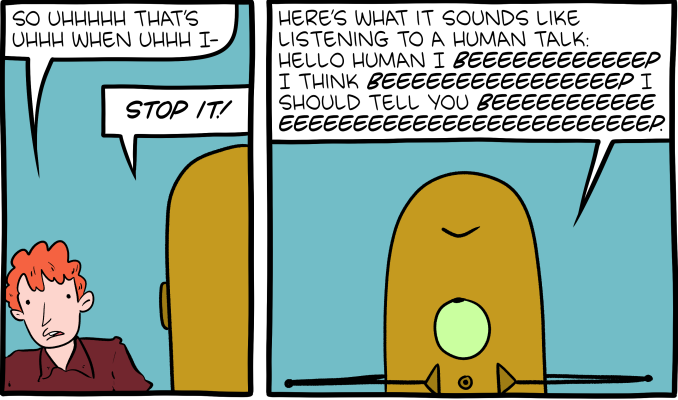The meaning of filled pauses?
« previous post | next post »
The first two panels of a recent SMBC:
The rest of it:
The aftercomic:

The mouseover title: "EEEEEEEEEEEEEEEEEEEEEEEEEEEEEEEEEEEEEEEEEEEEEEEEEEEEEEEEEEEEEEEEEEEEEEEEEEEEEEEEEEEEEEEEEEEEEEEEEEE"
More posts on related topics than you'll want to read:
"And uh — then what?", 1/5/2004
"Reanalysis — and not", 2/8/2004
"The meaning of eh", 5/1/2005
"Canadian 'eh' and Japanese 'ne'", 5/2/2005
"Status and fluency", 5/11/2004
"Clarifying status in Wolof by fake disfluency", 5/20/2004
"Um, em, uh, ah, aah, er, eh", 5/2/2005
"The the the and the thee the", 7/26/2005
"Young men talk like old women", 11/6/2005
"Trembling to be wrong", 12/20/2005
"The phonetics of flop sweat?", 9/26/2008
"'Babbling points' from all over", 9/30/2008
"Bebop language?", 11/61/2008
"Speaking (in)coherently", 11/20/2008
"More (dis)fluency and (in)coherence", 12/31/2008
"Uh accommodation?", 4/2/2010
"Repetition disfluency", 8/15/2011
"Fillers: Autism, gender, age", 7/30/2014
"More on UM and UH", 8/3/2014
"UM UH 3", 8/4/2014
"Male and female word usage", 8/7/2014
"UM / UH geography", 8/13/2014
"Educational UM / UH", 8/13/2014
"UM / UH: Lifecycle effects vs. language change", 8/15/2014
"Filled pauses in Glasgow", 8/17/2014
"ER and ERM in the spoken BNC", 8/18/2014
"Um and uh in Dutch", 9/16/2014
"UM / UH in German", 9/28/2014
"Um, there's timing information in Switchboard?", 10/5/2014
"Trending in the Media: Um, not exactly…", 10/7/2014
"UH / UM in Norwegian", 10/8/2014
"On thee-yuh fillers uh and um", 11/11/2014
"Labiality and feminity", 12/16/2014
"UM/UH accommodation", 11/24/2015
"UM / UH update", 12/13/2014
"More about UM/UH on the Autism Spectrum", 4/17/2016
"The rhetorical style of spontaneous speech", 8/16/2016
"The narrow end of the funnel", 8/18/2016
"Disfluencies and smiles", 930/2016
"Uh", 10/12/2016
"Mistakes", 3/8/2017
"Fluent disfluency", 3/12/2017
"Presidential fluency", 10/31/2017
"World disfluencies", 5/16/2018
"'Um, tapes?'", 1/20/2019
"Dysfleuncy considered harmful", 5/19/2019
"Qualifying fluency", 6/4/2019
"Communicative disfluencies interpolations", 12/14/2019
"Disfluency stylings: On beyond hesitation", 7/20/2020
"Donald Trump, now with more filled pauses", 1/3/2021


David Marjanović said,
February 5, 2022 @ 10:58 am
That's not universal among human cultures, though. I've read parts of a thesis on the Navajo language that said the "no gaps, no overlaps" strategy of conversation most cultures seem to have is absent from Najavo culture: if you reply immediately after your conversation partner seems to have finished a sentence, they'll think you didn't listen, and despise you accordingly – evidently you were planning your response while the other person was speaking, so you couldn't possibly pay attention to what they were saying.
[(myl) This, or something like this, is said to be a feature of many if not all indigenous cultures in North America. For discussion and references, see "The meaning of timing", 8/7/2009. There's also the many roles of silence in Japanese haragei — see Edwin McDaniel, "Japanese non-verbal communication", 1993. And more broadly, see Kris Acheson, "Silence in dispute", 2007.]
jin defang said,
February 5, 2022 @ 11:58 am
but there are a variety of filler words, and they don't all serve the awkward silence-filling functon . "um" might just imply that the speaker needs a moment to complete their thought. Another, "sort of" signifies that the speaker is hedging out of concern they might be contradicted or isn't really sure of something. A pet peeve because it's so overused. "People are sort of walking along the street." Really?
[(myl) Discussed from many angles, at great length, in the linked posts…]
Philip Taylor said,
February 5, 2022 @ 2:33 pm
The paper on haragei to which Mark linked in a reply to David M's comment looks very interesting, and I shall read it in full later, but I was rather taken aback by the author's "the inherent difficulties of the Japanese language". I can only assume that the author was implying "difficulties as perceived by a Westerner".
Scott P. said,
February 6, 2022 @ 11:46 am
Is Japanese particularly easy for Algonquin or Tagalog-speakers to pick up?
Philip Taylor said,
February 6, 2022 @ 12:22 pm
Is it more difficult than any other language for [Algonquin or Tagalog-speakers to pick up] would seem to me to be the real question. But as the author is a Westerner, I would be inclined to believe that he was looking at it from his own perspective rather than from that of a native Algonquin or Tagalog speaker.
Robot Therapist said,
February 6, 2022 @ 6:37 pm
>"I've read parts of a thesis on the Navajo language that said the "no gaps, no overlaps" strategy of conversation most cultures seem to have is absent from Najavo culture: if you reply immediately after your conversation partner seems to have finished a sentence, they'll think you didn't listen, and despise you accordingly – evidently you were planning your response while the other person was speaking, so you couldn't possibly pay attention to what they were saying."
I like that. It does however, it seems to me, require a further rule. You have to stop talking eventually. Some people seem to behave as if they are required to go on talking until interrupted.
Michael Watts said,
February 6, 2022 @ 9:50 pm
I've noticed this too; it interacts very badly with my usual practice of waiting for people to finish whatever they're saying before I respond.
Andy Stow said,
February 7, 2022 @ 12:33 pm
Somewhere I read or watched a businesswoman explain her strategy in response to her perception that she was consistently interrupted by men in meetings when she would stop for a breath. She started taking breaths at odd places in her speech, where it was obvious she wasn't done speaking, and said it worked very well.
E.g.
The project has been going well, but unfortunately we haven't [pause] got funding for next year. What we're going to do is invest more [pause] time in…
Trogluddite said,
February 8, 2022 @ 8:31 am
Coincidentally, the latest issue of New Scientist (British periodical) briefly reports this recent paper: Fast response times signal social connection in conversation(E. Templeton, Dartmouth College). From the NS's news report…
Sadly, I can't access the full paper, but, NS do highlight that the research cohort were all native US-English speakers, thus making it impossible to know to what degree this behaviour is culturally specific (unsurprisingly, all of the English language news reports I've read imply that it is universal).
As a British autistic person, I'm not surprised by those results. Social exclusion through lack of linguistic patience (q.v. @Andy Stow's post) is commonly reported by autistic people, and is no doubt experienced by many others disadvantaged by disability, social status, or simply their personality type. At gatherings of autistic people, a more patient, receptive style of communication is usually encouraged for exactly this reason, and the aforementioned Navajo skepticism about verbal spammers is shared by many autistics (albeit a tendency to monologue is also a quite common autistic trait).
Philip Taylor said,
February 8, 2022 @ 9:14 am
I think that this is the full text, Trogluddite.
Trogluddite said,
February 8, 2022 @ 12:44 pm
Thankyou, @Philip. I've only had time for a quick skim, but I'm glad to note that (as expected and as usual) the paper's authors are rather more circumspect than the popular press!
I also see that I wasn't too clear about what link I intended to make between autistic traits and the subject of the paper (in my ironic haste to blather!): One of the problems with conversation most often reported by autistic people is that it simply races along too quickly. Communicating via a "laggy" internet connection is a common analogy, and it is similarly a limitation imposed by real-time processing capacity (not merely disinterest or poor acculturation as is too often assumed). This almost certainly extends to one's ability to employ filler words, phatic/rhetorical idioms, repetition, etc. to gain processing time at the same time as holding others' attention.
Athel Cornish-Bowden said,
February 9, 2022 @ 3:00 pm
Andy Stow: There was a leading British politician, Michael Foot, I think, but that was a while ago, who used that technique to stop journalists from interrupting.